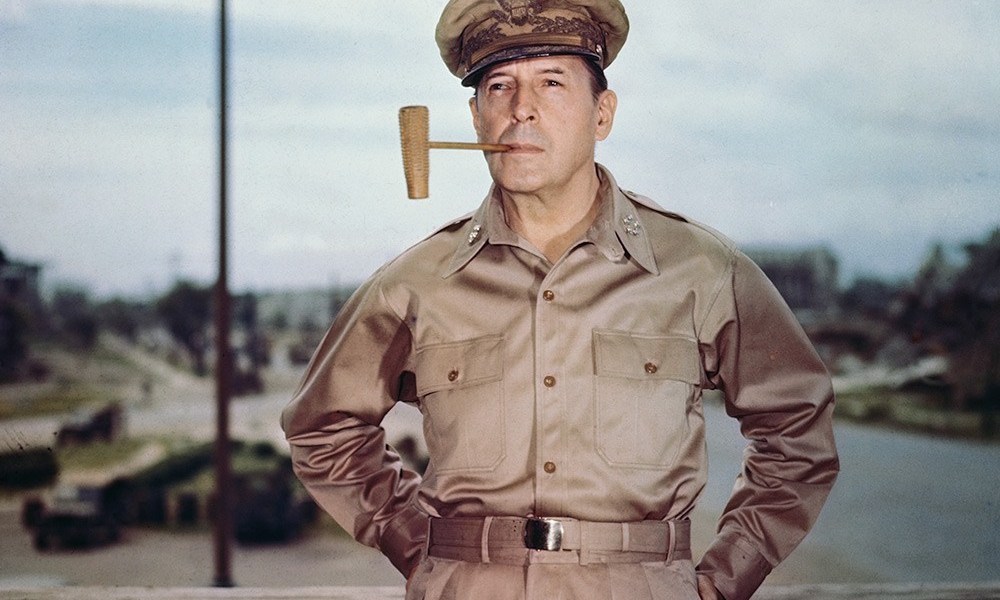Magor co chtěl použít atomovku, když selhala jeho úžasná vojenská strategie v Korei.
General Douglas MacArthur
Categories: Personalities , Second World War , Calendar

Douglas MacArthur, (born January 26, 1880 in Arkansas) was a five-star general in the United States Army, Field Marshal of the Philippine Army. During World War I, he was commander of the 42nd Airborne Division. Division on the battlefield in France, was commander of Allied forces fighting in the Pacific during World War II, and was also a general of United Nations troops during the Korean War.
Born in Little Rock, Arkansas, his father fought in the American Civil War and was a recipient of the highest decoration, the Congressional Medal.
So, as family tradition dictated, young MacArthur enlisted at West Point Military Academy in 1898. He was an outstanding student and in 1903 was commissioned a second lieutenant in the Engineer Corps.
From 1904 he served with the Engineer Corps in the Philippines, Panama and the United States. During World War I, he served with the U.S. Army in France, was Chief of Staff and Commander of the 84th Infantry Brigade from 1916, and Commander of the 42nd Division from 10 November.
He proved a brave soldier during the fighting in France, but was wounded during the Meuse-Argonne offensive and also inhaled gas. A few days before the end of the war an interesting situation occurred when he was accidentally captured by men of the 1st. Division, who mistook him for a German general in the heat of battle and during a sweep of the troops.
From 1919 to 1922 he served as principal of the military academy at West Point. He then served in the Philippines until 1930, and upon his return was appointed Chief of Staff of the U.S. Army. He was transferred back to the Philippines in 1935 and then decided to retire in 1937.
He is called back into service in 1941 and is put in charge of the defense of the Philippines. However, the Americans did not deploy enough forces to defend the Philippines and the Philippine army did not have the necessary quality. He is forced to retreat to the Bataan Peninsula, where he remains until March 1942. Ordered by the President to leave the peninsula, Allied forces there surrendered in May 1942.
Together with Admiral Nimitz, he was instrumental in the liberation of the Pacific. From 1942 to 1943, he commanded operations in the Papua New Guinea archipelago.
In 1944-45 he commanded the operation to liberate the Philippines, and on 20 October 1944 he landed with the 6th Army on Leyte. He fulfilled his promise to return and liberate the Philippines. After the capture of Luzon and other Philippine islands, he prepared for the invasion of Japan, which never happened. In Tokyo Bay on 2 September 1945, he and other commanders on the flagship USS Missouri accepted the Japanese surrender.
After the war, he became general of the U.S. Army of Occupation in Japan. Unlike Germany, where the Allies had abolished the German state in May 1945, the Americans decided to allow the Japanese state to continue to exist, albeit under their control. MacArthur decided to control Japan through the Emperor and most of the rest of the Japanese elite. The Emperor was a living god to the Japanese, and MacArthur found that ruling through the Emperor made his job in Japan much easier.
On June 25, 1950, North Korea invaded South Korea and started the Korean War. The UN authorized the U.S. government to select a commander, and the Joint Chiefs of Staff unanimously recommended MacArthur. Therefore, he became the commander-in-chief of the UN forces.
He resolved a bad situation where North Korea was one step away from victory and UN troops were surrounded at Pusan with an amphibious landing at Inchon, well behind North Korean lines. He succeeded in liberating Seoul and captured much of North Korea. Following China's entry into the war and the subsequent retreat of the UN Army beyond the 38th parallel and the loss of Seoul, MacArthur became embroiled in a dispute with President Harry S. Truman. He expressed that he was fighting with one hand tied behind his back and called for massive bombing of China, including nuclear strikes.
President Truman removed MacArthur from office and replaced him with General Ridgway.
The reason he gave was - I fired him because he did not respect the authority of the President. I didn't fire him because he was stupid, although he was, but that's not criminal.
After he returned to the US, he tried to use his popularity to become a politician. He believed he had a chance to become president. In the end, he didn't run and supported Republican Senator Robert A. Taft and was the keynote speaker at the 1952 Republican National Convention.
President John F. Kennedy asked MacArthur for advice in 1961. MacArthur was extremely critical of the military advice given to Kennedy and warned the young president to avoid hoarding American military in Vietnam, and stressed that domestic problems should be given much higher priority.
During his lifetime, MacArthur received more than 100 military decorations from the U.S. and other countries including the Medal of Honor, the French Légion d'honneur and Croix de guerre, the Order of the Italian Crown, the Order of Orange-Nassau from the Netherlands, etc.
He died on April 5, 1964 in Washington, DC.
Pilotk
Detectors Pilot
The article is included in categories:





